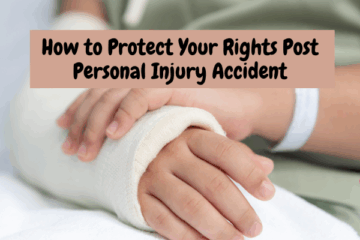Understanding Your Rights Under Medical Negligence Law

Empowering Patients: Understanding Your Rights Under Medical Negligence Law
Understanding your rights as a patient is a crucial element in navigating the complex terrain of medical care. When healthcare professionals fail to provide the standard of care expected, the consequences can be devastating.
As a layman, you may not know what constitutes medical negligence to warrant you seeking the help of medical negligence law firms. As such, this blog aims to empower you by detailing your rights under medical negligence law, so you know when to seek professional help and advice.
What is Medical Negligence?
Medical negligence occurs when a healthcare professional provides substandard care that directly causes harm or injury to the patient. This can include errors in diagnosis, treatment, aftercare, or health management. Understanding this definition is the first step in recognizing whether you have a valid claim.
Common Types of Medical Negligence
Medical negligence can manifest in various forms. Some common examples include:
Mistakes during surgery
Incorrect or delayed diagnosis
Medication errors
Failure to obtain informed consent
Inadequate follow-up care
Understanding Your Rights Under Medical Negligence Law: Your Rights as a Patient
As a patient, you have a set of fundamental rights designed to protect you from medical negligence.
These rights are established to ensure you receive appropriate and ethical care. They include:
Informed Consent
One of the most significant rights you possess is the right to informed consent. This means that your healthcare provider must fully inform you of the potential risks, benefits, and alternatives of any treatment. You should be able to make an informed decision about your healthcare without feeling pressured or coerced.
The Right to Confidentiality
Your medical records and personal information should be kept confidential, and accessible only to authorized personnel. Learn more about your privacy rights and protections by visiting this comprehensive guide on patient privacy rights.
Steps to Take if You Suspect Medical Negligence
If you suspect that you have been a victim of medical negligence, it is essential to act promptly. Here are some steps you can take:
1. Document everything: Keep a detailed record of all interactions, treatments, and symptoms.
2. Seek a second opinion: Consult another healthcare professional to verify your concerns.
3. Get your medical records: Obtain copies of your medical records to support your case.
4. Consult a legal expert: Speak with a solicitor who specializes in medical negligence to
evaluate your claim.
Understanding your rights and the steps you can take are vital in ensuring that you receive the justice you deserve. Ethical guidelines also play a crucial role in safeguarding patient rights.
Understanding the Legal Process
Pursuing a medical negligence claim can be a complex and often daunting process. However, understanding the legalities involved can help you navigate it with more confidence. The first stage typically involves gathering all necessary documentation and evidence to support your claim. This often includes medical records, witness statements, and expert opinions.
Once you have collected your evidence, the next step is to consult with a legal expert who specializes in medical negligence. They will help you assess the viability of your case and guide you through the subsequent legal proceedings. The process generally involves filing a formal complaint, engaging in pre-trial negotiations, and possibly going to court if a settlement cannot be reached.
Compensation and Its Impact
Compensation aims to place you, as much as possible, in the position you would have been had the negligence not occurred. This can cover a range of losses, including medical expenses, loss of earnings, and compensation for pain and suffering. It’s crucial to understand that the goal is not just financial reimbursement but also ensuring accountability and preventing similar incidents in the future.
Finding Support and Resources
Going through a medical negligence claim can be emotionally and mentally taxing. It’s essential to seek out support networks that can offer guidance and emotional support. Many organizations and support groups specialize in helping victims of medical negligence.
In addition to support networks, numerous online resources can provide valuable information. For instance, the National Center for Biotechnology Information offers extensive literature on medical standards and negligence, which can be a useful reference during your case.
Empowering Yourself Through Knowledge
Understanding your rights under medical negligence law is the first step towards taking control of your healthcare journey. While the process of making a medical negligence claim can be challenging, being well-informed and prepared can significantly alleviate some of the stress involved. Always remember that you have the right to safe, competent, and compassionate medical care.
If you feel you have been wronged, it is essential to take timely action. Documenting your experiences, seeking a second opinion, and consulting with a legal expert can make a substantial difference in building a strong case. Empowering yourself with the right knowledge and resources can significantly improve your chances of achieving a satisfactory resolution.
Closing Thoughts
Lastly, never underestimate the importance of emotional and mental well-being throughout this process. Lean on your support network and take advantage of available resources to guide you through. By doing so, you can navigate the complexities of medical negligence law with greater confidence and peace of mind.
Were you encouraged by what you read?
Then, would you share this article with a friend, co-worker, or family member?
Or, maybe you can send it to a friend or family member?
This blog occasionally uses affiliate links and may contain affiliate links.
Additionally, Melanie Redd is a participant in the Amazon Services LLC Associates Program.
This is an affiliate advertising program designed to provide a means for sites to earn advertising fees. These are earned by advertising and linking to amazon.com.
Also, for more on my disclosure policy, click HERE.
© Melanie Redd and Hope Ministry, 2024. Unauthorized use and/or duplication of this material without express and written permission from this blog’s author and/or owner is strictly prohibited.
Further, excerpts and links may be used, provided that full and clear credit is given to Melanie Redd and Hope Ministry.
Please give appropriate and specific directions to the original content.




0 Comments